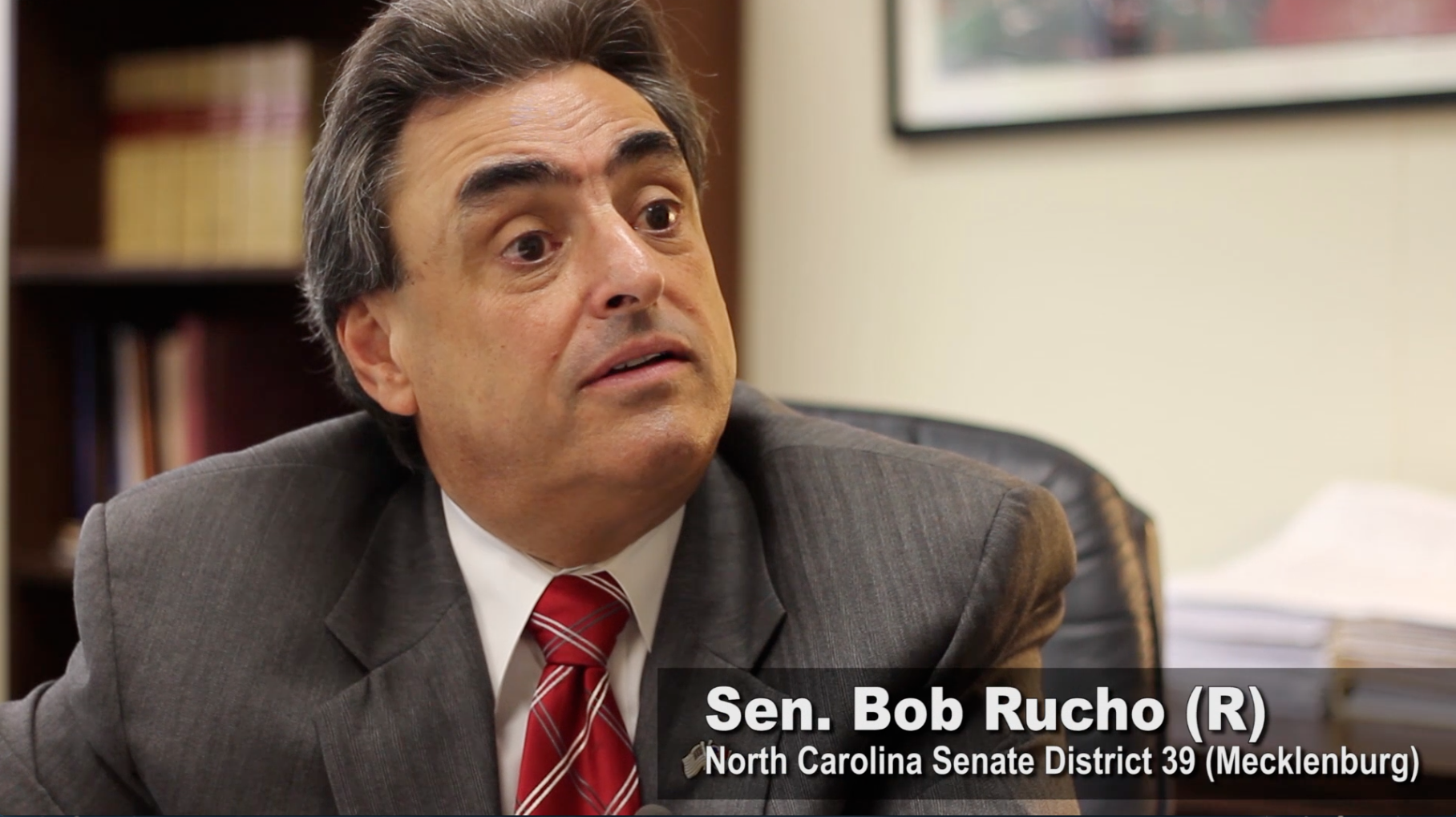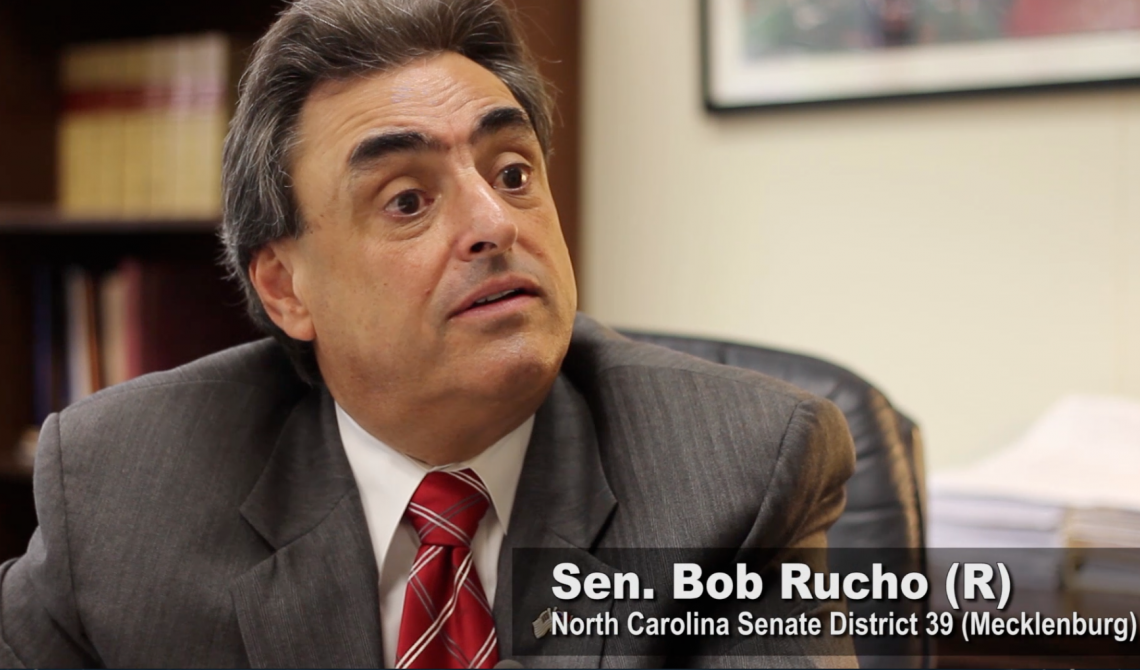
The Republican leaders in North Carolina are currently engaged in a power struggle over taxes and budget with one conservative leader resigning from a powerful leadership position while calling out corruption.
In North Carolina, the first time since the Reconstruction era, the Republican Party has super majority in both the House and the Senate of the General Assembly and there is a new Republican governor eager to prove himself on the national stage. It seems that the Republican Party of NC had seen this political situation as an historic opportunity to create a model of conservative reform for the nation.
Now, there is a bump in that aspiration and story. The House Republicans, Senate Republicans, uncompromising conservatives among Senate Republicans, and Republican Governor Pat McCrory are in fight over the budget and how to rewrite state tax laws.
At the center of the fight is Sen. Bob Rucho (R-Mecklenburg) who recently resigned as Co-Chair of the Senate Fiance Committee in protest. Sen. Rucho labored for over nine months to find a way to overhaul the current tax system so that it’s in line with the conservative philosophy.
That philosophy is that taxes should be “low, simple and equal” according to Sen. Rucho. And, the best way to achieve this is through eliminating the income tax and taxing consumption including services, and closing all loopholes. As Rucho puts it this way, “Everyone should be treated the same. No one gets special treatment.”
Rucho contends that every one of the Republican members of the Senate Finance Committee actually believes that this kind of massive overhaul of the tax system is needed and that the reason why that this is out of reach right now is entirely due to the influence of paid lobbyists representing powerful industries such as realtors and hospitals, i.e., corruption.
When Senate leader Phil Berger introduced his own compromise tax plan on June 11th taking Rucho’s plan off the table, Rucho resigned in a letter a few days later.
Craig Jarvis of Charlotte Observer summarizes the current Senate proposal:
The legislation follows a prescription promoted by national conservative tax reformers: imposing a flat income tax rate, phasing out corporate income and business franchise taxes, repealing the estate tax and closing loopholes.
Critics on the left, including Senate Democrats, say the package gives large, out-of-state corporations all the breaks and shifts the tax burden onto the middle class. Critics on the right – including Mecklenburg County Republican Sen. Bob Rucho – broke ranks with Senate leadership and said it didn’t go far enough and failed to get rid of unfair tax breaks.
Rucho resigned in protest as co-chairman of the Senate Finance Committee, citing the “fundamental disagreement” between the plan and his own proposal. Rucho also took a swipe at House Speaker Thom Tillis and Gov. Pat McCrory for not having “the political backbone to fight the special-interest groups.”
In this interview, Sen. Rucho openly calls out lobbyists, weak leadership among Republican leaders including and especially Governor McCrory, comparing unfavorably to Texas Governor Rick Perry and Louisiana Governor Bobby Jindal.
Although Rucho doesn’t mention him by name, House Speaker Tillis who has been championing the House version of the tax plan is running for a state-wide seat challenging the incumbent US Senator, Kay Hagan, a Democrat. Two salient facts about that: 1) He needs to win the majority of vote for the whole state; 2) He needs to raise millions of dollars for his campaign.
If Rucho’s analysis is right about why Republican leaders (House Speaker Thom Tillis, Governor Pat McCrory, and Senate Leader Phil Berger) are not going as far as Rucho wants in moving to a consumption-based tax system, then the current fight in North Carolina is about more than a philosophical difference between conservatives and progressives. The story is about establishment politicians who bend to pressure from industry lobbyists. It is about a political process that has been corrupted by big money.
In Part 2 of the interview, Sen. Rucho directly addresses the concerns of protesters attending Moral Mondays. He shares their concerns about poverty and economic opportunity, he says, but disagrees with their solutions. He also replies to economist Dr. Michael Walden who questions the direct connection between tax rates and economic growth. Rucho says he accepts that tax rates are not sufficient for economic growth, but asserts that it is necessary in order to be competitive.
It’s interesting that although the protesters at Moral Mondays would vehemently disagree with Sen. Rucho’s view on taxes, they would probably agree with his analysis that lobbyists and donors have undue influence over lawmaking in North Carolina. It is a process that that pits the individual voters against powerful industries that can afford to pay full-time professional lobbyists and make big campaign donations.
We wonder if the Moral Mondays movement and conservatives such as Sen. Rucho can agree that it is time to clean up the process and kick out industry lobbyists so that there can be room for an honest debate about how best to achieve economic growth and fairness in North Carolina.
Please support Story of America with a tax deductible donation.

